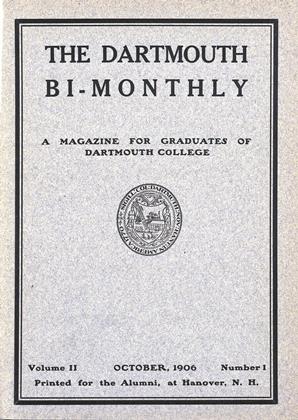The New Hampshire Historical society held its annual field day at Dartmouth College, October 9. The opening session was held in the auditorium of Dartmouth Hall in the afternoon. After a brief address of welcome by President William J. Tucker, and response by the Rev. Daniel C. Roberts of Concord, president of the society, Prof. Marvin D. Bisbee '71, College librarian, gave an interesting and comprehensive address on "Some Historical Sources of Dartmouth College." At the conclusion of this address Professor Bisbee conducted the members of the society in a tour of observation about the College. In the evening Col. Franklin B. Sanborn of Concord, Mass., gave a scholarly address on "Dartmouth College; Its Founders and Hinderers," after which the President and trustees of the College tendered the society a complimentary banquet in College Hall.
Professor Bisbee's address, which was the fruit, of years of research and study, was in part as follows:
"We have become accustomed to look upon the Earl of Dartmouth, who gave his name to our college, as a pious young man, subject at times to emotional religious extravagance and easily worked by shrewd agents of benevolent causes. But his stature bulks, rapidly as we come to know his relation with Lord North;his work at the head of the board of trade and as secretary of state for America; his influence in the repeal of the stamp act, his place as holder of the privy seal and high steward of Oxford University. It meant much that a breath of this full, rich, divine atmosphere surrounded the nursery of our infant institution.
"From the first Dartmouth has had a singular faculty of calling in personal forces in times of emergency, which have resulted in permanent enlargement. Dartmouth gave the supreme court its most important case and furnished the peerless advocate of all time to-win.
"I have designed a book-plate for the College library, with the shield of the College seal in the centre, surrounded at the four corners with the shield of Berkeley, representing the intellectual background, the shield of the Wheelocks, representing the founder, and the shield of the Websters, representing the refounder, the whole disclosing symbolically the chief sources of the history of our college."
Colonel Sanborn's address was a masterly review of the events centering round the organization of the College and the Dartmouth College Case. He said in part:
"From the year 1820, when the political and theological opinions of Mason, Smith, Webster, and Marshall took full effect, the people of New Hampshire as a political entity withdrew their confidence and affection from this College and its political advocates for thirty years. Neither the genius of Webster, nor the wisdom of Mason, nor the wit and learning of Smith, all for a time the darlings of New Hampshire, henceforth availed to carry measures or to triumph in elections.
"There was never a year after 1820 when Webster, thirsting for the presidency of the nation and abundantly qualified intellectually, if not morally, to fill that high station with honor, could have carried the popular vote of his native state. I therefore rank him and his associates in the great lawsuit which he so brilliantly won, as the chief hinderer of this College, of which he has been for more than a century the ornament and the pride. Had Dartmouth become a state university it would have led the way in that great educational movement in which the twenty or thirty existing state universities are now so conspicuous."
Prof. Edwin J. Bartlett '72 presided over the after-dinner speaking, when the following toasts were responded to: "Dartmouth College," President William J. Tucker; "The New Hampshire Historical Society," Hon. S. C. Eastman, Concord; "Ancient History,” Prof. C. D. Adams '77; "Modern History," Prof. H. D. Foster '85; "Biography" the Rev. Dr. H. F. Hill '67, Concord; "Geography," the Rev. Dr. L. L. Swain, Laconia; "Travel and Travelling Men," the Rev. Dr. E. M. Parker '84, Concord; "Lords and Ladies," Prof. J. K. Lord '68.
 View Full Issue
View Full Issue
More From This Issue
-
 Article
ArticleARE THE COLLEGES OF TODAY SUFFICIENTLY HONORING THE CLAIMS OF SCHOLARSHIP?
October 1906 -
 Article
ArticleFOOTBALL
October 1906 -
 Article
ArticleTHE College opened for its one hundred and thirty-seventh year,
October 1906 -
 Article
ArticleDARTMOUTH NIGHT DARTMOUTH NIGHT
October 1906 -
 Article
ArticleTHE ECONOMIC CONDITIONS OF DARTMOUTH COLLEGE
October 1906 By Warren M. Persons -
 Article
ArticleCOLLEGE NOTES
October 1906









